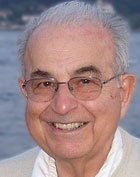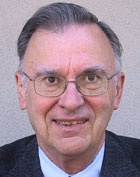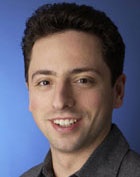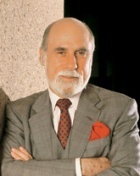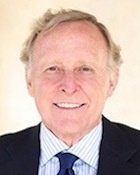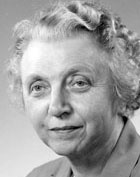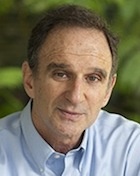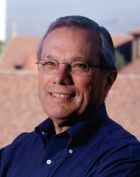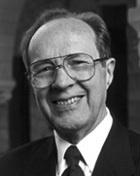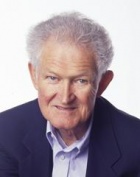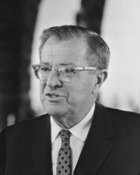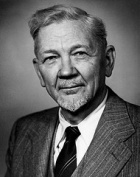Stanford Engineering Heroes
The Stanford Engineering Heroes program recognizes the achievements of Stanford engineers who have profoundly advanced the course of human, social and economic progress through engineering.
Because engineers often work behind the scenes, the Heroes program's objective is to highlight the profound effect engineering has on our everyday lives and to inspire the next generation of engineers. Twenty-nine engineers – selected from among alumni and former faculty by a panel of distinguished subject-matter experts and technology historians – have been named as Heroes since the program began in 2010.
November 11, 2014
Three Influential Innovators Named Stanford Engineering Heroes
Distinguished Stanford engineers honored for their impact on our lives and the world.
Heroes - Tabs
Andreas Acrivos
Andreas Acrivos is an internationally recognized educator and researcher who has had a transformative impact on the field of chemical engineering, especially in the areas of fluid mechanics, heat and mass transfer. His research on the flow of viscous fluids made it possible to model, analyze, and engineer chemical and fluid processes – with applications in numerous industries, including petroleum recovery and microelectronics. Upon receiving his PhD from the University of Minnesota in 1954, Acrivos joined the Chemical Engineering faculty at the University of California, Berkeley. He was recruited by Stanford in 1962 as a professor of Chemical Engineering and was instrumental in transforming that department into one of international stature. In 1988, after accepting one of New York State’s Albert Einstein Chairs in Science and Engineering, he took early retirement from Stanford and joined the City College of the City University of New York as a professor of Chemical Engineering and director of the Levich Institute. He returned to Stanford in 2007 and is associated with the Flow Physics and Computational Engineering group of the Mechanical Engineering department. He has received numerous awards from engineering and scientific organizations in the United States, including the 2001 National Medal of Science, and is an elected member of the National Academy of Engineering, the National Academy of Sciences and the American Academy of Arts and Sciences.
Marcian "Ted" Hoff
Marcian "Ted" Hoff is best known as the architect of the first microprocessor, Intel's 4004, released in November 1971. He devised the idea that if the architecture could be constructed simply, the memory, calculating and processing functions of a computer could be combined into one circuit instead of many custom-designed circuits. The Intel 4004 paved the way for many subsequent breakthroughs in personal computing, communications and the Internet. Hoff was the first Intel Fellow, the highest technical position in the company. He is a U.S. National Medal of Technology and Innovation winner, a recipient of the IEEE/RSE Wolfson James Clerk Maxwell Award, has been named to the National Inventors Hall of Fame and is a Fellow of the Computer History Museum. He attended Stanford as a National Science Foundation Fellow, and holds both a master’s degree and a PhD in Electrical Engineering.
Charles Simonyi
Charles Simonyi is a high-tech pioneer, philanthropist and space traveler. He is co-creator of the first WYSIWYG text editor (Bravo) and was the chief architect of Microsoft Word, Excel and other widely-used application programs. He is founder and CTO of Intentional Software, a maker of software to support idea generation and presentation. He was the fifth space tourist and the first ever tourist to fly twice. He is a member of the U.S. National Academy of Engineering, the American Academy of Arts and Sciences, correspondent member of the Hungarian Academy of Sciences and the Chairman of the Board of Trustees of the Institute for Advanced Study in Princeton. He holds a BS in engineering mathematics from the University of California, Berkeley, and a PhD in computer science from Stanford. He and his wife, Lisa, have made numerous philanthropic contributions supporting the Arts and Sciences as well as other charitable causes worldwide.
Andreas Acrivos |
Kenneth Arrow |
Craig Barrett |
Andreas Bechtolsheim |
John A. Blume |
Sergey Brin |
Vint Cerf |
Morris Chang |
James H. Clark |
George Dantzig |
Ray Dolby |
William F. Durand |
David Filo |
Irmgard Flugge-Lotz |
Edward Ginzton |
Martin Hellman |
William Hewlett |
Marcian "Ted" Hoff |
Donald Knuth |
Charles Litton |
Theodore Maiman |
John McCarthy |
David Packard |
Larry Page |
Bradford Parkinson |
William J. Perry |
Calvin Quate |
Sally Ride |
Charles Simonyi |
Fred Terman |
Stephen Timoshenko |
Jerry Yang |
